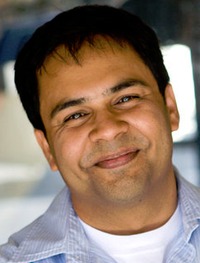Monday, April 8, 2013
Incubating LA's Startup Future At the USC Viterbi Startup Garage

A few weeks ago, the University of Southern California announced a new startup incubator, the Viterbi Startup Garage (http://vsi2.usc.edu/vsg-about/), backed by such notable investors as Kleiner Perkins Caufield & Byers and the United Talent Agency. What's the idea behind the incubator--which gives its startups $20,000 in capital, education, mentoring, working space, and more--and how is it tied to USC? We spoke with Ashisih Soni, who heads up the incubator, to learn more, and why the two, very notable investors are backing the effort.
What's the mission behind the new startup incubator?
Ashish Soni: The mission behind the startup incubator is to boost the number of engineering co-founded or led technology companies, both from the engineering school at USC, and also in the broader Los Angeles area as well.
How did the incubator come about?

Ashish Soni: I created the plan for this last fall, in collaboration with Kleiner Perkins Caifueld & Byers, who has one of their partners on the board of our institute. We've been talking about a partnership, and we just started a conversation with Kleiner about this, with the United Talent Agency getting involved last December. That's basically how the program come about.
Kleiner is a very notable partner for something like this. What drew their interest in the incubator?
Ashish Soni: I don't want to talk for them, but what I can say, is they are a big believer in engineering backed companies, technology ventures which are led by engineers. They're also big fans of the engineering school, and they're on our advisory board as well. They were interested in boosting companies coming out of USC.
Why USC?
Ashish Soni: We have the second largest engineering school in the nation, in terms of the student body. We have a very large Ph.D. student body, graduates, and undergrads, I think a total of around 6,200 to 6,400 engineering students. We have a top 10 engineering school, a top computer science department, and research going on in everything from big data, mobile platforms, artificial intelligence, B2B, B2C. There's a very broad range of scientific expertise. We also have the folks at the Information Sciences Institute in the Marina, who have lots of expertise in areas of computer science, natural language processing, big data, and other areas. The companies we're potentially looking for in the incubator are doing very interesting, hard core science, not just working on the next mobile app.
There are many challenges in getting technology out of a university and into a successful startup. How are you addressing those challenges?
Ashish Soni: Our philosophy, is that not every engineer or engineering student can build a technology company. But, what we find, is that the students who are the most talented and want to build a company, tend to move North to get access to capital, to gain access to the support system, and to connect with more people like them, engineers who have build companies before. There's a shortage of those types of people in Los Angeles. We are giving students the same support, but here. We're giving them access to capital, mentors to build companies, and all here in Los Angeles.
There's been a lot of incubation activity in the Los Angeles are recently. What's the advantage of incubating a company at USC, versus one of those outside accelerators and incubators?
Ashish Soni: Our biggest advantage, is the unique partnership we have with Kleiner and the UTA. We know that every single startup needs two critical things. Assuming they have a good team, they need access to capital, and they need access to early customers and adopters, where they can do good business development. We have two partners who are the best in the world in what they do. Kleiner knows financing, and has deep insights into the broader trends in the world of startup ecosystems and technology. UTA is very, very good in strategic business development. That triad gives us a very broad set of expertise and a network. On our end, we have a top engineering school, and phenomenal students. Pairing that up with the venture leaders in the space, with business development, creates a unique opportunity.
How do companies and entrepreneurs apply?
Ashish Soni: The URL for applications is open right now, and we start our first class on April 22nd. It's open to USC students and USC alumni, and the only criteria that you have to have is that you have one of our engineering students or alumni as a co-founder or as your CEO.
Thanks!